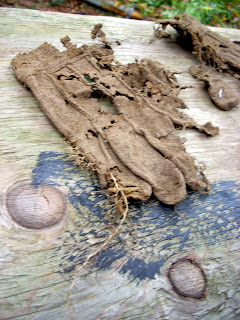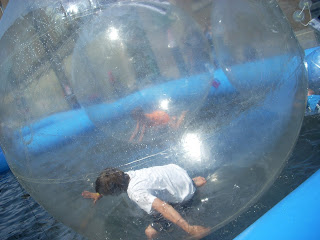
This Mac computer, which already feels too hot under my wrists, had been turned off since Friday.
Our Fourth of July was quiet, J's and mine. In the early morning while the house was still cool he read the Declaration of Independence out loud as I walked up and down the living room, my bare feet on the carpet.
He read from the booklet containing The Declaration of Independence, The Constitution of the United States, and The Constitution of New Jersey, which I had received at graduation from Junior High School along with the engraved "Certificate of Promotion to the Senior High School." The Board of Education gave us--in lavish blue and gold with ribbons--this gift to officially welcome us to the Republic. Not that I thought in those terms on graduation day. Yet many of my teachers had already schooled us by example and by drawing us out with questions, in Civics class, and in the regular classroom. They raised questions; we answered; sometimes we fumbled; we thought. Most of our teachers had come down from New England, unmarried women--that was the rule when they were hired--to work in New Jersey. Hazel Putnam, descendent of the Revolutionary War General Israel Putnam had taught me about the Republic.
I had been nervous about letting J. touch this gold-stamped memento and artifact of another time and a past life and I made him promise not to "slop it up." I administered the oath--"I promise, I swear . . . "--and he took it. You see, earlier he had tried to read from the print facsimile in the New York Times and found it unreadable even with a magnifying glass, so I had volunteered my treasure and then took the risk. It was worth it, and the documents are still in good shape.
We both loved the inditement section in which the crimes of George III, King of England, are rolled out one after another, gathering force, in 27 succinct paragraphs beginning mostly with "He." He the king had done this; he had done that. He had gone too far. His acts, his crimes, had piled up. Enough!
Our founders indited a king.
"A prince whose character is thus marked by every act which may define a tyrant, is unfit to be the ruler of a free people."
The passage in which the founders' recounted their unsuccessful appeals to their "British brethren" lit up for me and J:
We have reminded them of the circumstances of our emigration and settlement here. We have appealed to their native justice and magnanimity, and we have conjured them, by the ties of our common kindred, to disavow these usurpation, which would inevitable interrupt our connections and correspondence. They, too, have been deaf to the voice of justice and consanguinity.
Consanguinity: with blood, with common blood. Blood brothers: English to English.
Don't we all have blood in common, aren't we all commoners? Blood when it shows in my veins through my pink skin is blue, which does not make me and others like me superior blue bloods as distinguished from darker-skinned people who do not appear blue-veined. All blood is red; when it dries it is purplish. Royal purple, common red: all of us. Red, white, and blue, etc., etc. Bring on the colors! But flag raising is not to my taste.





















































